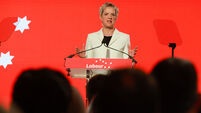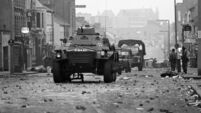Dearbhail McDonald: Patience and hard work needed to realise potential of Good Friday Agreement

Taoiseach Leo Varadkar meets members of the late David Trimble's family Lady Trimble and Nicholas Trimble at the Sharing Peace, Sharing Futures event in the Abbey Theatre on Sunday night. Picture: Julien Behal
Had she had the right to vote, Gail McConnell, 17 years of age at the time of the Good Friday Agreement, would have voted yes.
She would have voted yes even though her 35 year old father William, a prison officer in the Maze, was gunned down in 1984 by the IRA in front of her and her mother as they waved him off to work.
















